

A Virginia rental agreement is a legal contract between a landlord overseeing a rental property and a tenant who wishes to use it. Virginia landlord-tenant law governs these agreements; rental terms must be within the limits allowed by law.
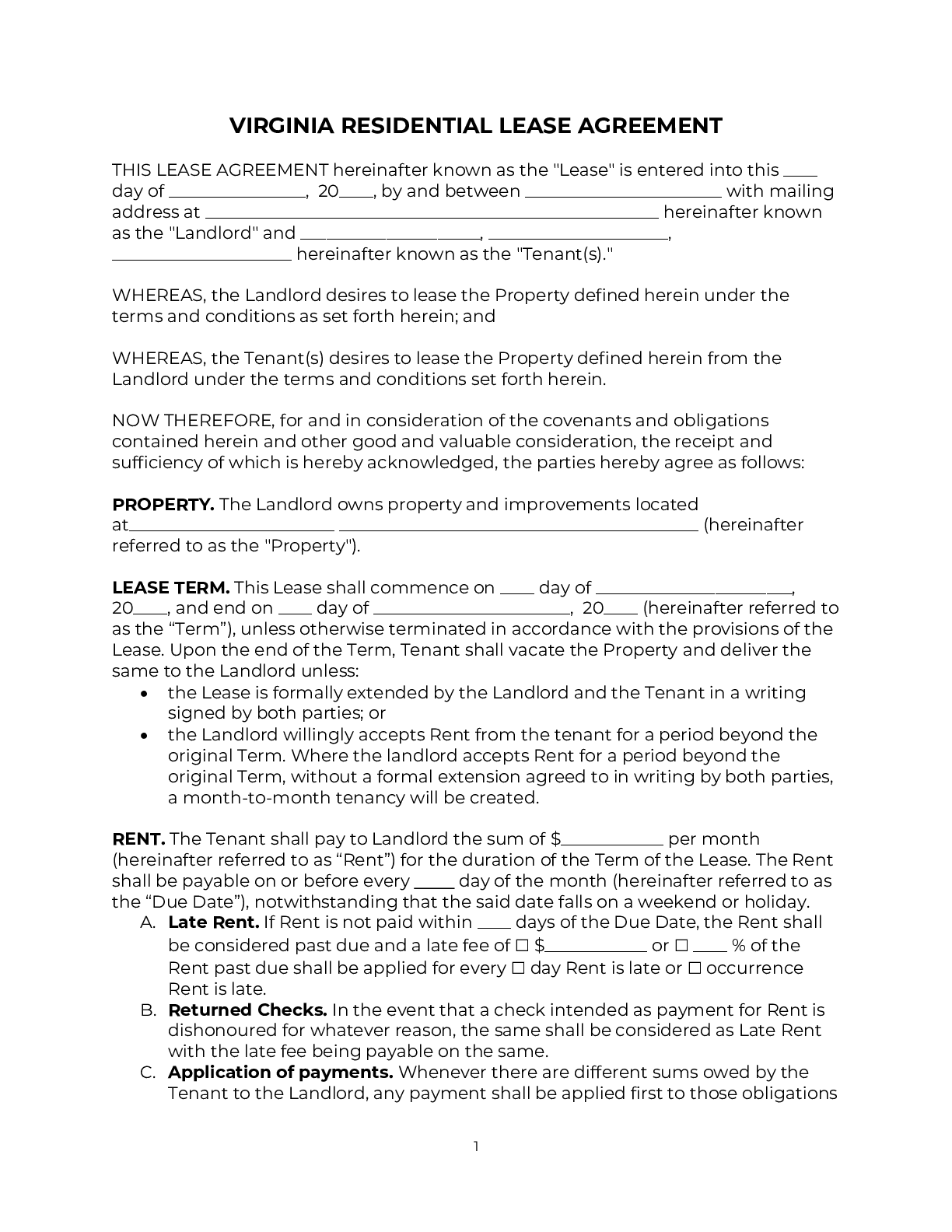
A Virginia residential lease agreement (“rental agreement”) is a legal contract for a tenant to rent a residential property from a landlord, subject to terms and conditions agreed by all parties.
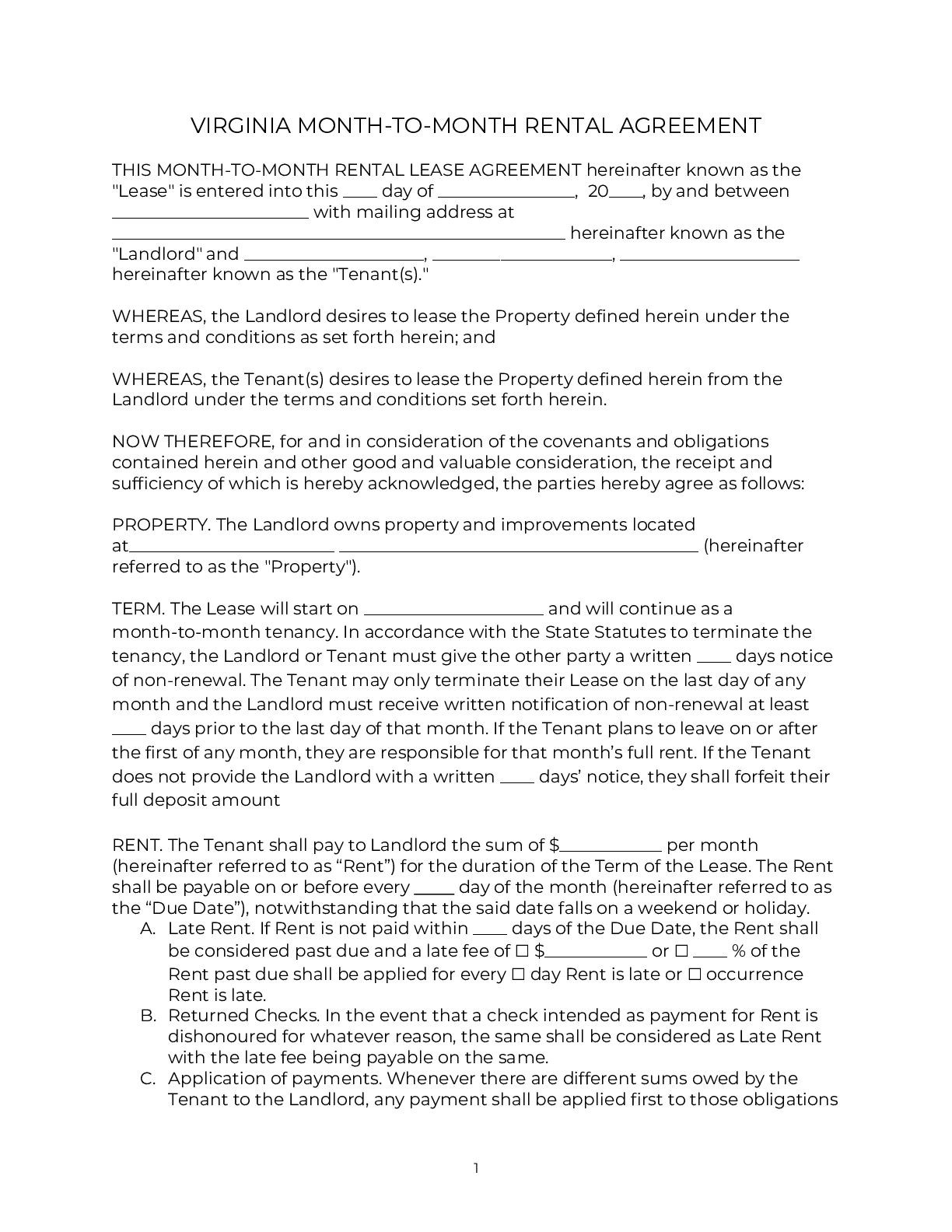
A Virginia month-to-month lease agreement is a contract (not necessarily written) where a tenant rents property from a landlord. The full rental term is one month, renewable on a month-to-month basis.
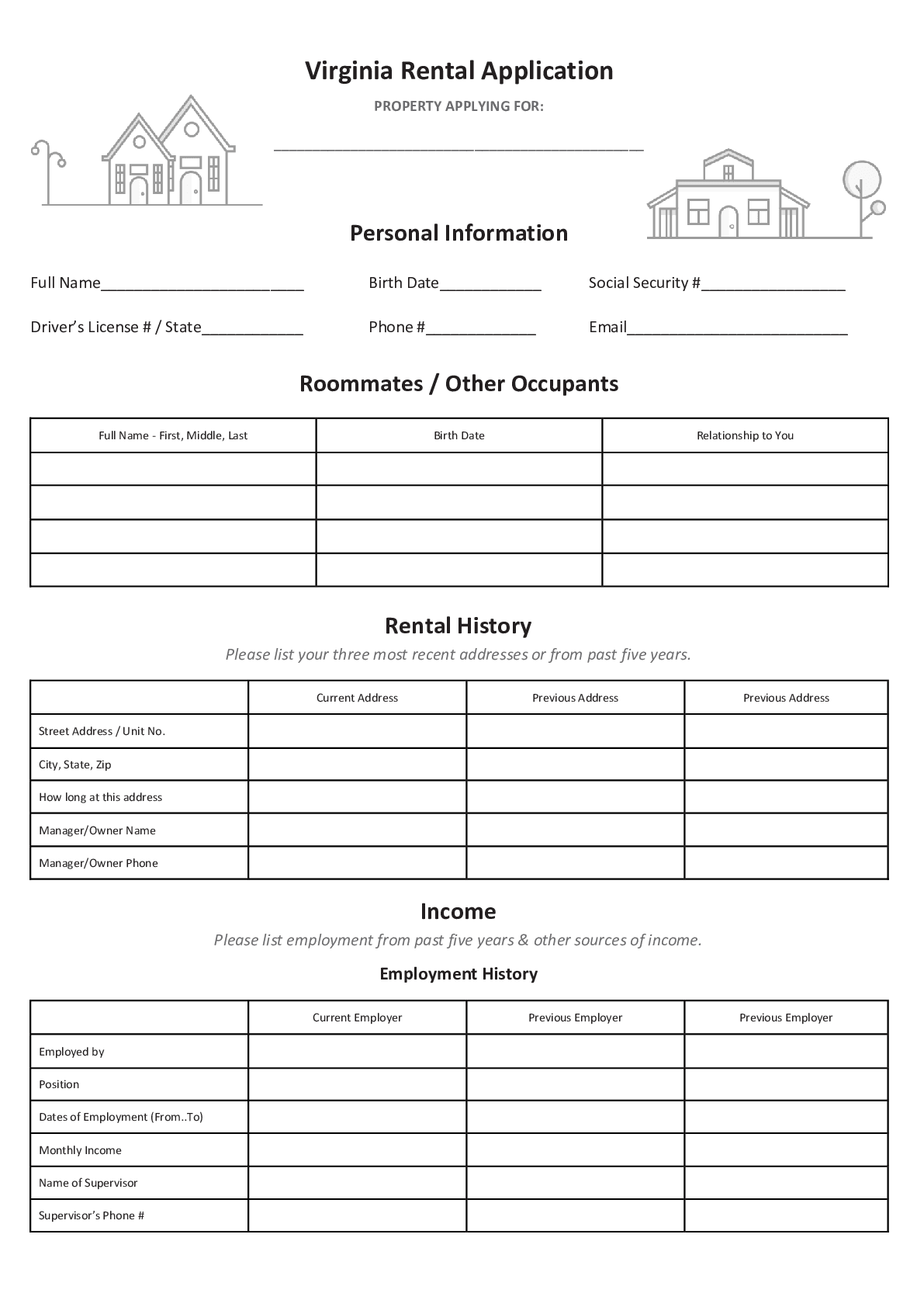
Virginia landlords may use a rental application form to screen prospective tenants. A rental application collects information relating to finances, rental history, and past evictions.
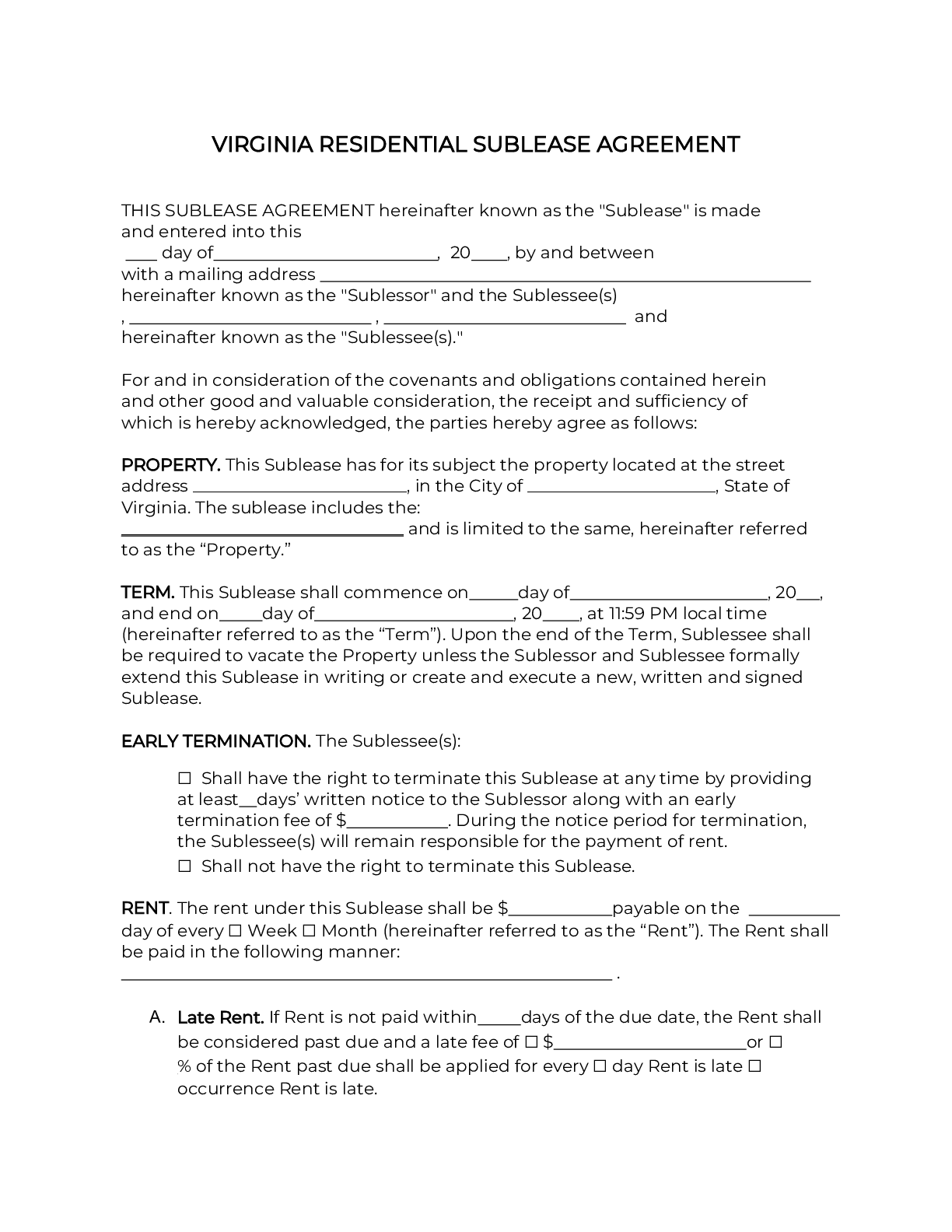
A Virginia sublease agreement is a legal contract where a tenant ("sublessor") rents (“subleases”) property to a new tenant (“sublessee”), usually with the landlord’s permission.
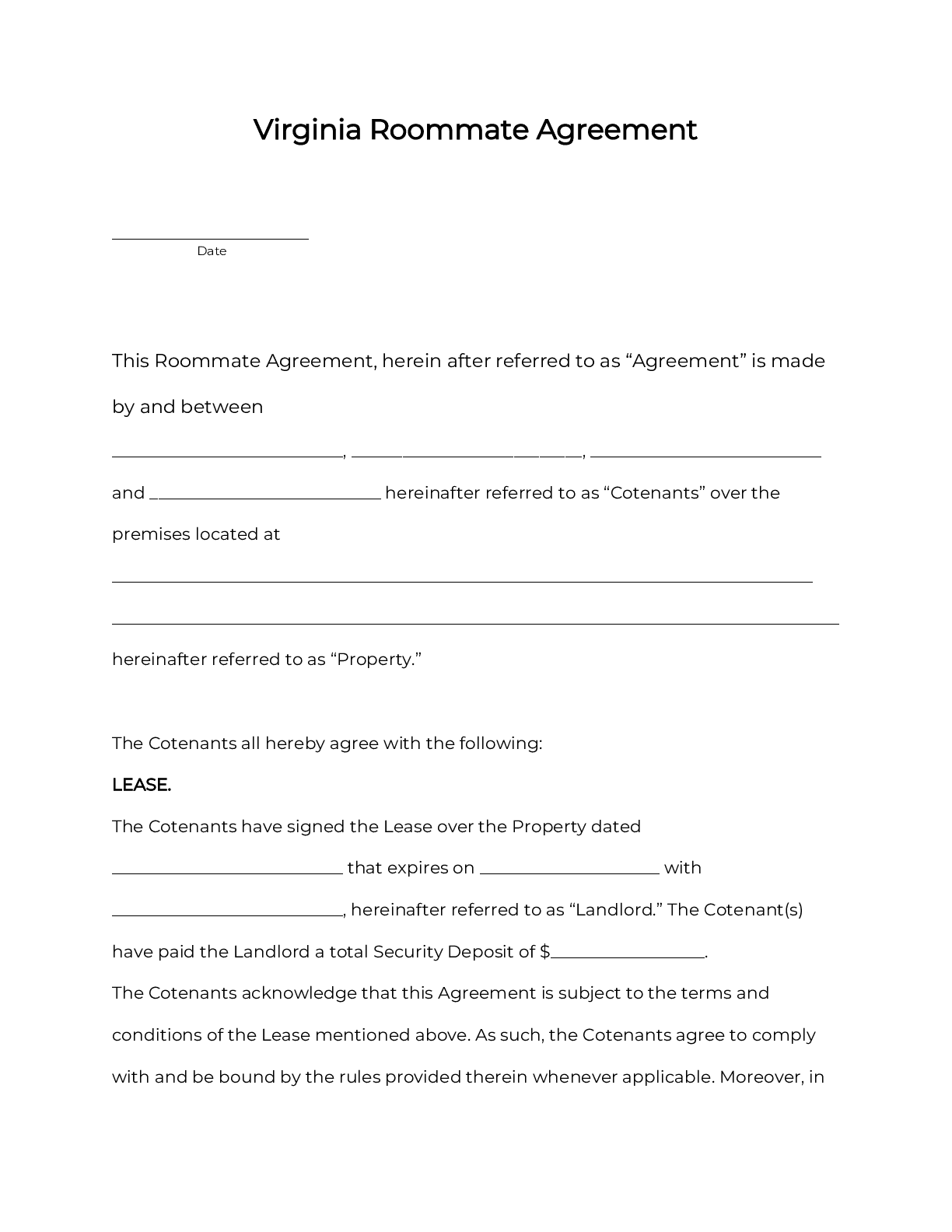
A Virginia roommate agreement is a legal contract between two or more people (“co-tenants”) who share a rental property according to rules they set, including for things like splitting the rent. This agreement binds the co-tenants living together, and doesn’t include the landlord.
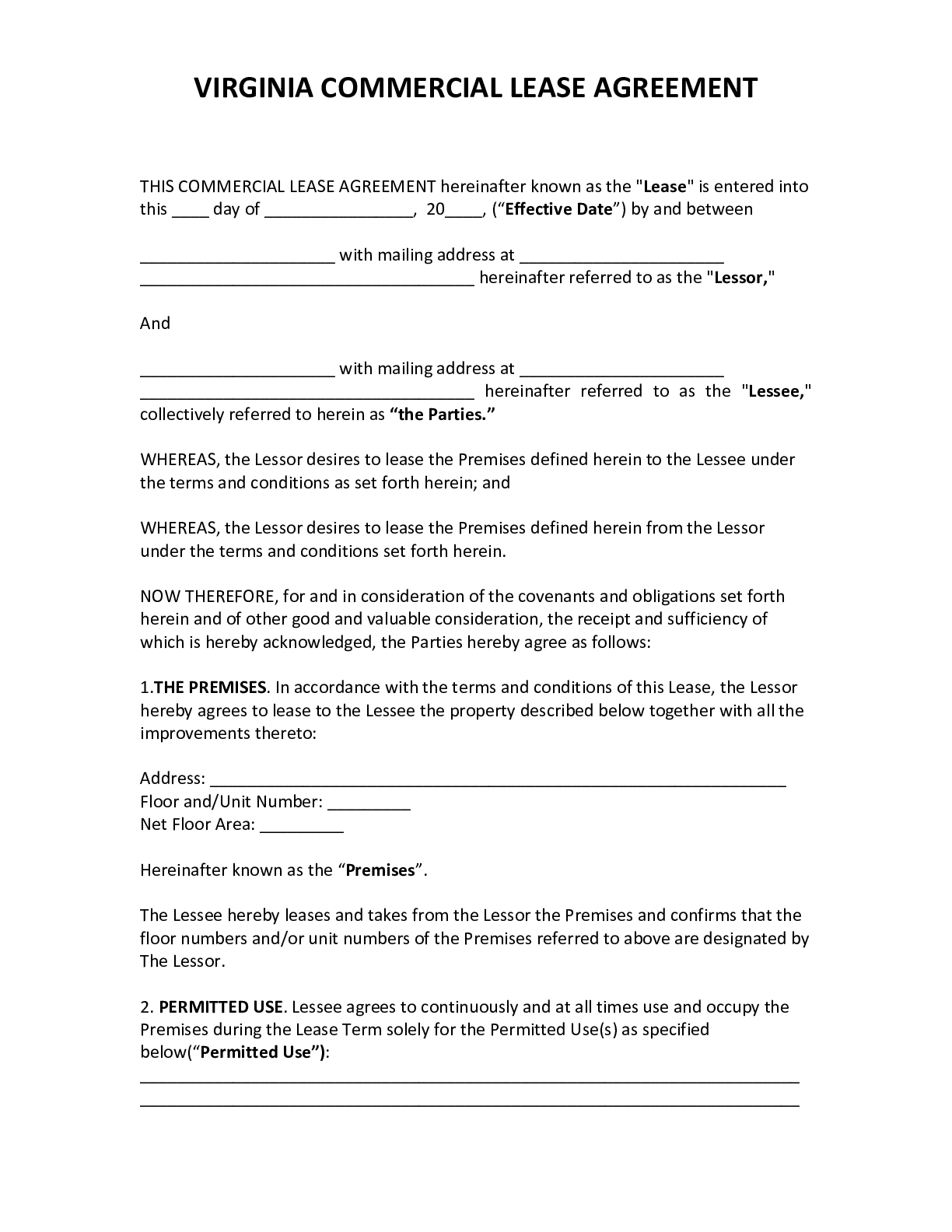
A Virginia commercial lease agreement is a legal contract arranging the rental of commercial space between a landlord and a business.
To learn more about required disclosures in Virginia, click here. Some Virginia cities, like Virginia Beach, may require additional disclosures. Local laws apply in addition to state laws.
In addition to disclosures in the lease itself, Virginia law also requires a landlord to provide a tenant with an extra hard copy of the lease once per year upon request, or make a copy easily accessible online at no cost to the tenant. [3]
To learn more about landlord tenant laws in Virginia, click here.
(Expires July 1, 2025) Eviction Diversion Pilot Program; process; court-ordered payment plan.
A. A tenant in an unlawful detainer case shall be eligible to participate in the Program if he:
1. Appears in court on the first docket call of the case and requests to have the case referred into the Program;
2. Pays to the landlord or into the court at least 25 percent of the amount due on the unlawful detainer as amended on the first docket call of the case;
3. Provides sworn testimony that he is employed and has sufficient funds to make the payments under the court payment plan, or otherwise has sufficient funds to make such payments;
4. Provides sworn testimony explaining the reasons for being unable to make rental payments as contracted for in the rental agreement;
5. Has not been late within the last 12 months in payment of rent as contracted for in the rental agreement at the rate of either (i) more than two times in six months or (ii) more than three times in 12 months;
6. Has not exercised the right of redemption pursuant to § 55.1-1250 within the last six months; and
7. Has not participated in an eviction diversion program within the last 12 months.
B. The court shall direct an eligible tenant pursuant to subsection A and his landlord to participate in the Program and to enter into a court-ordered payment plan. The court shall provide for a continuance of the case on the docket of the general district court in which the unlawful detainer action is filed to allow for full payment under the plan. The court-ordered payment plan shall be based on a payment agreement entered into by the landlord and tenant, on a form provided by the Executive Secretary, and shall contain the following provisions:
1. All payments shall be (i) made to the landlord; (ii) paid by cashier’s check, certified check, or money order; and (iii) received by the landlord on or before the fifth day of each month included in the plan;
2. The remaining payments of the amounts on the amended unlawful detainer after the first payments made on the first docket call of the case shall be paid on the following schedule: (i) 25 percent due by the fifth day of the month following the initial court hearing date, (ii) 25 percent due by the fifth day of the second month following the initial court hearing date, and (iii) the final payment of 25 percent due by the fifth day of the third month following the initial court hearing date; and
3. All rental payments shall continue to be made by the tenant to the landlord as contracted for in the rental agreement within five days of the due date established by the rental agreement each month during the course of the court-ordered payment plan.
C. If the tenant makes all payments in accordance with the court-ordered payment plan, the judge shall dismiss the unlawful detainer as being satisfied.
D. If the tenant fails to make a payment under the court-ordered payment plan or to keep current any monthly rental payments to the landlord as contracted for in the rental agreement within five days of the due date established by the rental agreement, the landlord shall submit to the general district court clerk a written notice, on a form provided by the Executive Secretary, that the tenant has failed to make payments in accordance with the plan. A copy of such written notice shall be given to the tenant in accordance with § 55.1-1202.
The court shall enter an order of possession without further hearings or proceedings, unless the tenant files an affidavit with the court within 10 days of the date of such notice stating that the current rent has in fact been paid and that the landlord has not properly acknowledged payment of such rent. A copy of such affidavit shall be given to the landlord in accordance with § 55.1-1202.The landlord may seek a money judgement for final rent and damages pursuant to subsection B of § 8.01-128.
E. Nothing in this section shall be construed to limit (i) the landlord from filing an unlawful detainer for a non-rent violation against the tenant while such tenant is participating in the Program or (ii) the landlord and tenant from entering into a voluntary payment agreement outside the provisions of this section.
The landlord may enter the dwelling unit without consent of the tenant in case of emergency. The landlord shall not abuse the right of access or use it to harass the tenant. Except in case of emergency or if it is impractical to do so, the landlord shall give the tenant notice of his intent to enter and may enter only at reasonable times. Unless impractical to do so, the landlord shall give the tenant at least 72 hours’ notice of routine maintenance to be performed that has not been requested by the tenant. Such routine maintenance shall be performed within 14 days of delivery of the notice to the tenant, and the notice shall state the last date on which the maintenance may possibly be performed. If the tenant makes a request for maintenance, the landlord is not required to provide notice to the tenant.
A. If the tenant gave notice to the landlord during the tenancy that his dwelling unit was in violation of an applicable building code, such violation posed a substantial risk to the health, safety, or welfare of a tenant, and such violation resulted in the tenant being excluded from his dwelling unit due to such unit being condemned, the landlord shall be liable to the tenant for actual damages. The landlord shall also return to the tenant any (i) prepaid rent that had not become due as of the date of condemnation, (ii) security deposit, or (iii) rent paid, if any, to the landlord subsequent to the unit being condemned.
B. No landlord shall be liable pursuant to this section if:
1. The condemnation of the dwelling unit was caused by (i) the deliberate or negligent act or omission of the tenant, an authorized occupant, or a guest or invitee of the tenant or (ii) an act of God; or
2. The lease was properly terminated pursuant to § 55.1-1240.
A landlord shall offer a prospective tenant a written rental agreement containing the terms governing the rental of the dwelling unit and setting forth the terms and conditions of the landlord-tenant relationship and shall provide with it the statement of tenant rights and responsibilities developed by the Department of Housing and Community Development and posted on its website pursuant to § 36-139. The parties to a written rental agreement shall sign the form developed by the Department of Housing and Community Development and posted on its website pursuant to § 36-139 acknowledging that the tenant has received from the landlord the statement of tenant rights and responsibilities. The written rental agreement shall be effective upon the date signed by the parties.
If a tenant fails to sign the form available pursuant to this subsection, the landlord shall record the date or dates on which he provided the form to the tenant and the fact that the tenant failed to sign such form. Subsequent to the effective date of the tenancy, a landlord may, but shall not be required to, provide a tenant with and allow such tenant an opportunity to sign the form described pursuant to this subsection. The form shall be current as of the date of delivery.
A landlord shall provide, beginning on the first page of the written rental agreement, a description of any rent and fees to be charged to the tenant in addition to the periodic rent. Immediately above the list of fees, the written rental agreement shall state: No fee shall be collected unless it is listed below or incorporated into this agreement by way of a separate addendum after execution of this rental agreement.